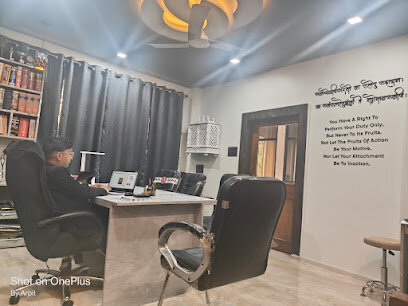Best Juvenile Law Lawyers in Bhopal
Share your needs with us, get contacted by law firms.
Free. Takes 2 min.
List of the best lawyers in Bhopal, India
About Juvenile Law in Bhopal, India
Juvenile Law in Bhopal, as in the rest of India, focuses on the legal rights, responsibilities, and protections offered to individuals who are below 18 years of age and are alleged to have committed legal violations. The key legislation guiding this area is the Juvenile Justice (Care and Protection of Children) Act, 2015. This law aims to rehabilitate juveniles instead of simply punishing them. The process is designed to ensure that children in conflict with the law are dealt with in a manner conducive to their overall development, keeping in mind their age and psychological state. In Bhopal, matters concerning juvenile offenses or the care and protection of vulnerable children are handled by designated Juvenile Justice Boards (JJBs) and Child Welfare Committees (CWCs).
Why You May Need a Lawyer
Legal help in Juvenile Law is often required in Bhopal for a variety of situations, including:
- When a minor is accused of committing an offense and needs representation before the Juvenile Justice Board.
- Cases involving child protection, such as abuse, neglect, trafficking, or abandonment.
- Matters related to custody, foster care, and adoption involving children.
- Seeking bail or release from children's homes or observation centers.
- Appealing against the decisions of the Juvenile Justice Board or Child Welfare Committee.
- Guidance on the rights and legal procedures for both the child and parents or guardians.
Local Laws Overview
Bhopal follows the national framework of Juvenile Law provided by the Juvenile Justice (Care and Protection of Children) Act, 2015. However, state-level rules and local authorities play a significant role in implementation. Key aspects include:
- The definition of a juvenile as any person under 18 years of age.
- Establishment of the Juvenile Justice Board (JJB) to hear cases involving minors accused of offenses.
- The Child Welfare Committee (CWC) is responsible for the care and protection of children not involved in criminal conduct but who need assistance or protection.
- Mandatory rehabilitation, counseling, and educational measures instead of punitive action for minors.
- Special procedures for crimes of a serious nature by minors aged 16 to 18, where the JJB assesses whether the case should be transferred to regular courts (for heinous offenses).
- Confidentiality requirements, including restrictions on publication of names and identities of juveniles.
- Bail and custody provisions specific to juveniles, focusing on their best interests.
Frequently Asked Questions
What age is considered as juvenile under the law in Bhopal, India?
Anyone who has not completed 18 years of age is considered a juvenile under the law.
How are juveniles treated differently from adults in the legal system?
Juveniles are dealt with by special courts - the Juvenile Justice Boards. The focus is on rehabilitation and care rather than punishment.
Can a juvenile be tried as an adult in Bhopal?
Yes, for heinous offenses committed by children between 16 and 18, there may be a preliminary assessment by the Juvenile Justice Board. If found to have sufficient mental and physical capacity, the case may be transferred to a regular court.
Are parents or guardians required to be present during proceedings?
Yes, the presence of parents or guardians is generally required to ensure the best interests of the child are represented.
What rights does a juvenile have during interrogation?
Juveniles have the right to legal representation, to be accompanied by a parent or guardian, and not to be subjected to harsh questioning or physical coercion.
What role does the Child Welfare Committee play?
The Child Welfare Committee deals with children in need of care and protection, not those accused of crimes. They ensure the welfare, rehabilitation, and rights of vulnerable children.
What is the usual process after a juvenile is taken into custody?
The child is produced before the Juvenile Justice Board within 24 hours, and further action is taken according to the nature of the offense and the child's needs.
Can a juvenile get bail?
Yes, bail is generally favored in juvenile cases unless it is not in the best interests of the child or might bring them into association with known criminals.
How are the records of juvenile offenders treated?
Juvenile records are confidential and are not disclosed to protect the child’s future prospects and reintegration into society.
Is legal aid available for juveniles in Bhopal?
Yes, free legal aid is provided to children in need through the District Legal Services Authority and other legal aid organizations.
Additional Resources
Here are some helpful resources and organizations in Bhopal related to Juvenile Law:
- District Child Protection Unit, Social Justice Department, Bhopal
- Juvenile Justice Board, Bhopal District Court
- Child Welfare Committee, Bhopal
- State Commission for Protection of Child Rights, Madhya Pradesh
- District Legal Services Authority, Bhopal
- Local branches of NGOs such as CHILDLINE 1098, Save the Children, or Bachpan Bachao Andolan
Next Steps
If you or someone you know requires legal assistance related to Juvenile Law in Bhopal, please consider the following steps:
- Consult a lawyer specializing in Juvenile Law for personalized legal advice.
- Contact the District Legal Services Authority if you need free legal aid.
- Visit the offices of the Juvenile Justice Board or Child Welfare Committee for guidance on procedures and referrals.
- Gather all relevant documents and information regarding the child and the incident in question.
- Ensure the best interests and rights of the child are the primary concern at every stage.
Lawzana helps you find the best lawyers and law firms in Bhopal through a curated and pre-screened list of qualified legal professionals. Our platform offers rankings and detailed profiles of attorneys and law firms, allowing you to compare based on practice areas, including Juvenile Law, experience, and client feedback.
Each profile includes a description of the firm's areas of practice, client reviews, team members and partners, year of establishment, spoken languages, office locations, contact information, social media presence, and any published articles or resources. Most firms on our platform speak English and are experienced in both local and international legal matters.
Get a quote from top-rated law firms in Bhopal, India — quickly, securely, and without unnecessary hassle.
Disclaimer:
The information provided on this page is for general informational purposes only and does not constitute legal advice. While we strive to ensure the accuracy and relevance of the content, legal information may change over time, and interpretations of the law can vary. You should always consult with a qualified legal professional for advice specific to your situation.
We disclaim all liability for actions taken or not taken based on the content of this page. If you believe any information is incorrect or outdated, please contact us, and we will review and update it where appropriate.










